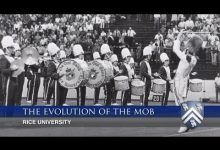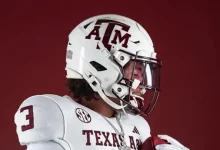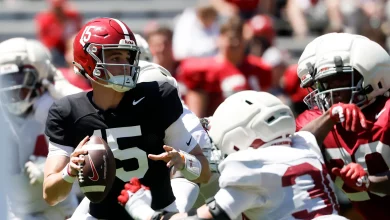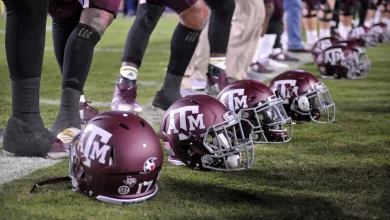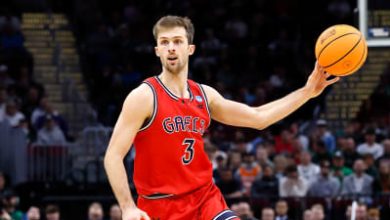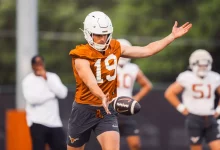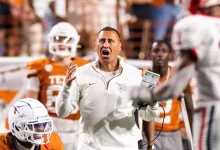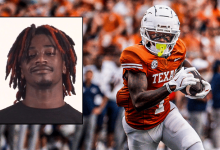Derrick Henry’s rumored contract extension with the Baltimore Ravens raises concerns due to his age and potential decline.
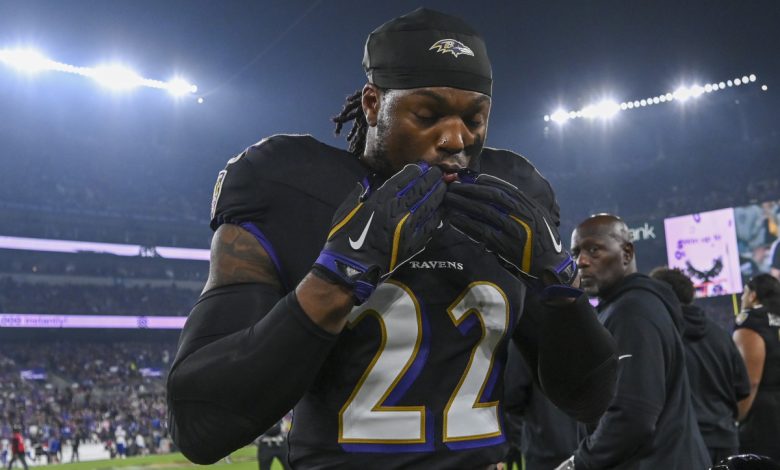
When a player like Derrick Henry enters the rumor mill, especially when it’s about a potential contract extension with a high-profile team like the Baltimore Ravens, it grabs the attention of both fans and analysts. Henry, known for his dominant rushing performances and being one of the most physically imposing running backs the NFL has seen in recent years, has sparked curiosity about his future in the league. The possibility of him signing a contract extension with the Ravens, one of the league’s most storied franchises, comes with its share of excitement, but also a healthy dose of skepticism, particularly regarding his age and potential decline.
As the NFL continues to evolve, many teams are increasingly aware of the volatility that comes with investing heavily in running backs, especially those who have carried the ball as much as Henry has. The position, once viewed as central to an offense, has become less of a focal point in today’s pass-heavy game, with a growing trend of teams using a committee approach in the backfield. So when a player like Henry, who has been an absolute workhorse for the Tennessee Titans since entering the league in 2016, starts to show signs of age and potential decline, there are valid concerns.
In this article, we will examine the possible ramifications of a Derrick Henry contract extension with the Baltimore Ravens, exploring his age, the physical toll of his career, the changing landscape of the running back position, and how his potential fit in Baltimore could either be a great success or a costly gamble for the team.
Derrick Henry’s Career: A Dominant Force
Before diving into the specifics of his potential move to Baltimore and a contract extension, it’s important to take a look at what Derrick Henry has accomplished in his career up to this point. Since being drafted in the second round by the Tennessee Titans in 2016, Henry has become one of the most dominant running backs in the NFL. His combination of size (6’3” and 247 pounds) and speed has been the envy of defenses across the league, and his ability to wear down opponents with long, punishing runs has earned him the nickname “King Henry.”
Over the years, Henry has built a resume that is nothing short of remarkable:
- 2019 NFL Offensive Player of the Year after leading the NFL with 1,540 rushing yards and 16 touchdowns.
- He broke the NFL single-game rushing record in 2020 with 2,027 yards, becoming only the eighth player in NFL history to rush for over 2,000 yards in a season.
- Henry is a three-time Pro Bowler and has led the league in rushing yards in multiple seasons.
In his prime, Henry was often the focal point of the Titans’ offense, and his ability to dominate defenses helped Tennessee remain competitive in the AFC. His towering presence as a battering ram in the backfield made him an ideal centerpiece for the Titans’ play-action offense, which thrived on setting up deep shots after running the ball down teams’ throats. However, as much as Henry’s individual accolades have been impressive, the question now arises about whether his body can continue to hold up, given the wear and tear of his playing style.
The Toll of the Workload: Age and Physical Decline
At 29 years old, Derrick Henry is approaching the critical age threshold for running backs in the NFL. While some running backs have defied expectations by playing at a high level into their 30s, history tells us that the odds are stacked against players in this position. The average lifespan of an NFL running back, especially one who has carried the ball as much as Henry, is generally much shorter than other positions.
Henry’s playing style has been particularly taxing on his body. Known for his punishing stiff-arm and his ability to break tackles, Henry is rarely brought down by arm tackles, which forces defenders to go for his legs and hips. This creates more opportunities for injury, as the physical toll of constantly carrying the ball, often 20-30 times a game, takes a significant toll on his joints, muscles, and ligaments. Over the years, Henry has been fortunate to avoid serious injuries, but as he gets older, there are mounting concerns that the injuries may begin to pile up.
Additionally, Henry’s style of play, while effective, has resulted in an unusually high volume of carries. To put it into perspective:
- In 2019, Henry led the NFL in rushing attempts with 303, a number that only a handful of backs in the modern NFL can approach.
- In 2020, he rushed for a staggering 378 attempts, and though he missed nine games in 2021 due to a foot injury, his workload the previous seasons was significant enough to raise red flags.
As Henry continues to age, there are concerns about whether he can maintain the kind of workload he had earlier in his career. History has shown that running backs who have exceeded 300 carries in multiple seasons often experience a significant drop-off in production in their late 20s or early 30s. With Henry nearing the 30-year-old mark, his body may start to decline faster than it did in his younger years, which brings into question the wisdom of signing him to a long-term extension.
The Ravens’ Running Back Position and Recent Trends
The Baltimore Ravens have long been known for their commitment to the run game, thanks in part to their reliance on Lamar Jackson as a dual-threat quarterback. Jackson’s unique ability to both run and pass makes the Ravens’ offense dynamic, but they have also had standout running backs to help carry the load. In recent years, running backs such as J.K. Dobbins and Gus Edwards have been featured in the backfield, but neither has truly been able to take over in the same way Henry has in Tennessee.
The Ravens’ offensive approach under head coach John Harbaugh has traditionally been run-heavy. They consistently rank near the top of the NFL in rushing attempts, which fits their style of play. With Lamar Jackson drawing attention as a running quarterback, the Ravens have often taken advantage of a balanced rushing attack, combining traditional running back carries with Jackson’s ability to scramble and break off big runs. But while the team has been productive on the ground, it hasn’t had the same kind of dominant, feature back as Henry in recent years.
Enter Derrick Henry, whose presence in the Ravens’ backfield could offer them the chance to return to a more dominant rushing attack. Henry’s size, speed, and power would complement Jackson’s dynamic playmaking, giving Baltimore one of the most potent running games in the NFL. However, there are risks associated with acquiring an aging running back, especially one who has already carried the ball as much as Henry.
The Ravens’ front office, led by general manager Eric DeCosta, must decide whether a player like Henry is worth the financial commitment, given his age and potential for decline. At 29, Henry has likely entered the later stages of his prime, and any long-term deal could potentially be a financial burden if his performance drops off.
The Financial Implications and Risks of a Contract Extension
Given the risks associated with signing an aging running back to a long-term deal, it’s important to evaluate the potential financial implications of a contract extension for Derrick Henry. Historically, teams that have committed to running backs on long-term contracts have sometimes regretted those deals when the players begin to decline. For example, running backs like Ezekiel Elliott and Todd Gurley both received significant contracts only to see their performance dip in subsequent years.
A contract extension for Henry would likely need to balance his past performances with the reality of his age. If the Ravens were to sign him to a deal, it would likely have to be structured with incentives based on performance, minimizing the financial risk in the event that his production wanes. The team could opt for a short-term extension, perhaps two or three years, which would give them an opportunity to assess Henry’s performance before making a long-term commitment. This could help limit the risk, but it would still come with the question of whether he can sustain his level of play over a full season.
Additionally, if Henry were to sign a large contract extension, the Ravens would need to ensure that they still have the financial flexibility to address other key areas of need on the roster. For example, Jackson’s own contract extension has been a topic of much debate, and his future with the team is just as important as Henry’s. The Ravens would need to carefully consider the salary cap implications of signing a high-priced contract for a running back who may be on the decline.
Fit in Baltimore: A Gamble or a Perfect Match?
From a football perspective, Derrick Henry could be a perfect fit for the Ravens’ offense. His physicality and ability to dominate defenses would make him an ideal complement to Lamar Jackson’s unique talents. Henry could help take the pressure off Jackson by giving the Ravens a consistent ground game, potentially improving their offensive efficiency and keeping defenses on their heels.
That said, the question of whether signing Henry is a wise move depends largely on how much longer the team believes he can sustain his elite level of play. If the Ravens’ coaching staff believes Henry’s best years are behind him, then the move could backfire, and they might be left with a player who is not able to contribute in the same way he once did. However, if they see Henry as a player who can continue to be productive for another few seasons, especially in a role where his workload is managed, the deal could be a win.

